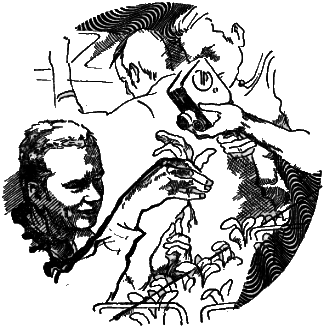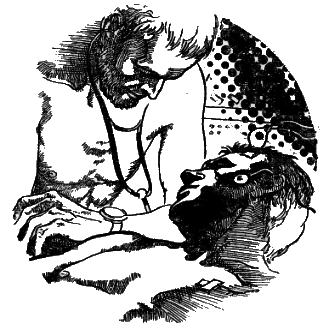Between the years 1967 and 1968 a Russian institute for space medicine called the Institute of Biomedical Problems staged a year long simulation of a spaceflight. In a model spaceship a crew of three ground-based cosmonauts rehearsed a long-term stay in orbit. Under constant observation, they were examined both physiologically and psychologically. This experiment has never been attempted before. One of the participants, Andrey Bozshko kept a diary through out his experience, from the selection process to the end of the isolation. He reflects on the testing and the significance of their Earth bound journey. His diary was subsequently published as a novel, ‘A Year Inside a Spaceship on Earth.’ The following is a chapter where Bozshko compares the crew’s experience to other historic precedents. – Julia Tcharfas

Psychology: Lessons in life
Boris is making dinner. A process that involves carefully measuring water in a beaker, pouring it into a bowl along with the contents of a plastic bag, and stirring everything together.
My interests keep being absorbed by the complexity of the relationship between the three of us inside of this sealed chamber. First of all, why us three? Perhaps at present, three is the minimum number of specialists required for the complex of scientific work required in a long-term space flight? Yet, sometimes it seems that it would be easier with just two.
I am reminded of O’Henry’s dark and humorous claim. ‘If you want to encourage the craft of homicide, put two people in a hut with dimensions of eighteen to twenty feet. Human nature can not cope with this.’ His joke holds a grain of truth. The chief medical officer of the USA submarine fleet, G. Alvis wrote that even a submarine crew, which consists of intelligent and compliant people has to be periodically modified because of the abusive relationships that occur from time to time. While the great US specialist in Arctic expeditions, Admiral Byrd believes that the aggressive emotions in isolation exacerbate. ‘During winters in Little America’ writes Byrd, ‘I spent many hours with a man on the verge of either murder or suicide due to the imagined persecution by another, who formerly was his faithful friend.’ D. Ebersole, a doctor on the atomic submarine Seawolf, spoke of the ways the crew entertained themselves by ‘getting a rise out of each other’; trying to find an outlet for those aggressive reflexes, inevitable in conditions of long isolation from the outside world… Many psychologists believe that within relations between people exists a kind of a natural law, where order is maintained through the necessary efforts, and confusion arises all by itself – a constant in both good and bad relationships.
Turns out, our three-some poses some serious problems associated with the ‘triangle’ of relations. So far, everything has been seemingly all right. With the period of establishing and restructuring our relationship behind us, it is absolutely clear to me that the most difficult trial is the three of us in the same closed room, which we cannot leave even if something is troubling us. This constant mental state exhausts, perhaps more than anything else. I believe that German and Boris must be having the same feelings…

For a long time I lay with my eyes closed, trying to sleep. A kaleidoscope of events flickering before my eyes: the house, the clinic, and the sealed chamber. The silence is deafening, like thoughts and feelings striking against a steel wall. They cannot penetrate through to the outside. An intense longing rolls over me, a painful sense of loneliness. I must not succumb to it and remember that we are a scientific expedition – three specialists! Yet we are only people who suffer from imprisonment.
Psychologist B. Aliakrinsky has identified three types of stimuli. One is the type a person cannot have any effect on: rolling thunder, pouring rain. With the second type, human impact is possible, but the desired effect may not be achieved: conversations, noisy audience. And finally, the third type of stimuli is when effect is achievable, for example with an unpleasant neighbor.
It is precisely the last type of stimuli, which are the source of confusion and misunderstanding. And if a person learns to mentally refer to them as part of the first two categories, he will be able to consciously avoid imminent conflict and find resolutions.
I remember how at the end of an exceptional six-week live-in experiment doctor E. Gavrikov warmly spoke about the mastermind of the project, psychologist B. Aliakrinsky, who helped him and doctor S. Chukichev survive a 45-day isolation in a hyperbaric chamber.
‘Having been psychologically prepared, I was able to gain a true friend out of this experiment.’ He said. ‘Sometimes I think that if it was not for ‘psychology’, Sergei and I would be enemies instead of friends.’
E. Gavrikov and S. Kukishev received serious psychological training. They were prepared for the possibility of conflicts. B. Aliakrinsky taught them to explore the ‘anatomoy’ of reasons for their quarrels. Misunderstandings could occur over any reason and the two researchers were different in every way: different age, one was 25, while the other 44, different attitudes, and habits. In addition, prior to the experiment they were not acquainted.

These researchers followed the psychological training method of B. Aliakrinsky. In addition, throughout the course of the experiment, each of them developed the ability to form objective judgment, self-analysis, endurance, balance, and tolerance for actions of their comrades, even if these actions stemmed from differences in education, bad habits, or lack of life experience.
It is known that the feeling of aggressiveness in the early stages of its development is manageable. In the early ‘embryo’ you can suppress any imminent outbreak of anger. The difficulty is that during the time of the ‘conception’ of this feeling, it is beyond the realms of consciousness. Here is where the psychological training can help. It allows for the detection of negative emotions, as soon as they make themselves felt. One needs to learn how to find these embryos in time and steer them in the right direction. Particularly helpful are mental re-enactments of conflict. Thus, in the experimental expedition performed by E. Gavrikov and S. Kukishev, in the most general terms of course, relations between members of the actual crew could be predetermined.
Similar re-enactments of likely events are not new. The famous Soviet pilot M. Gromov, thought he warned many accidents thanks to constantly playing them in his mind. Mental playback allows for the discovery of a correct way out of difficult situation and dulls emotional poignancy. Because of this, a person’s experience happens in the real world as an already familiar event…
Our life has shown that the triangle relationship is not simple. The third always influences the challenges between the other two. I noticed how as soon as relationship changes for two, the overall configuration of relations change between all. German and I have much in common, German and Boris, perhaps no less. It seems that Boris and I also have enough common interests. Why then at times are our lives woven with misunderstandings and quarrels? Why do disagreements create the alliance of two against the third?

I would love to look at us from the outside, to be an impartial arbitrator. And yet, for some time, it has become clear to me that no one look from the outside can be impartial. We are all aware that no one can get inside of our relationship, and judging it is almost impossible, for there is no one but us, who would be able to understand what is experienced. Perhaps this is why we try to solve all of our difficulties and contentious issues without the assistance from others?
In such conditions, where there is no opportunity to ‘vent’, the journal becomes the only silent friend and always a loyal ally. In addition, it allows a look at the events of yesterday from today’s perspective, and such analysis is always useful. The journal will ‘remember’ events for the future that are impossible to keep in memory. It is capable of ‘defusing’ a heated environment, and at the same time, helps to critically assess the actions of comrades. It is a good remedy for suppression of irritants and helps to capture the interesting events of our lives. Finally, the work in the journal fills free time, prohibiting the development of idleness – the most terrible enemy in isolation. That is why day after day I keep a diary of the events of our lives. German does the same, and probably for the similar reasons…
Why then do our relations become more complicated every day? I often think about the ominous examples of disunity of those who happen to experience the particular condition. Take for instance Jack London’s three gold miners – good friends and in principle, good guys. Cut off and submerged by snow in their tent, they began to hate one another. I remembered another episode from the life of the famous Arctic explorer Fridtjof Nansen and his friend and assistant Iogansen. These two people of high discipline and courage spent almost a year and a half trekking from the North Pole to Franz Josef Land. They traveled through masses of ice in soaked through icy clothes. Survived by eating only raw walrus meat. Used the warmth of their bodies to warm jars of snow to get a drink. But the most severe aspect that they had overcome was communication between them. Despite having departed as close friends, they became so annoyed with each other that they almost gave up speaking. Barely once a week, they exchanged a few laconic phrases, addressing each other purely formally, ‘Expedition Leader’ and ‘Chief Navigator’. On their return to the mainland, they became friends again. The reasons for their cooling to one another remained a mystery.
The case of Nansen and his friend is indicative and can serve as a model to some extent to others. But the so-called ‘incompatibility’ in the particular condition is still not the rule. For example, Ziganshin’s heroic four escaped the predicament. In the early 1960s during a storm in the Pacific Ocean a barge from the coast of the Kuril Islands was swept away into the ocean with four Soviet soldiers on board: Ashat Ziganshin, Philip Poplavsky, Anatoly Kruchkowsky and Ivan Fedotov. After a forty-nine days drift they were picked up by an American aircraft carrier and taken to San Francisco. This case, which became their feat, amazed the whole world. But perhaps, most of all, the foreign correspondents were shocked by the sense of cohesion between those Soviet soldiers. After the drift a question was asked of Ziganshin. ‘In this condition, you can lose the sense of humanity, go mad, or simply turn into animals. You must have had quarrels, maybe a fight over the last piece of bread, or the last drink of water?’ In response Ziganshin said, ‘For all of the forty nine days members of the crew had not said a single harsh word to one another. Once fresh water was running out, everyone received a half a cup for the day. And no one took an extra sip. Only when we were celebrating the birthday of Anatoly Kruczkowsky, did we offered him a double portion of water, but he refused.’

This unity of the Soviet four can be explained through various rationales: they continued to have a strong faith in their salvation and continued their struggle. Among them was a strong leader, and the education of the Soviet people is in spirit of mutual support. These are many reasons. Yet one thing is certain: the Soviet people are collectivists in spirit. We are raised with the principles of high integrity inherent in the nature of socialist society. But, of course, each of us does not lose our own individual identity.
We have no hostility for one another, but sometimes it is difficult to overcome extreme subjectivism in the name of a common cause. As it is difficult at times to calmly look into the eyes of another. However sitting at the same table, breathing the same air, while confined in a very limited space, will be our fate for many more months. There is nowhere to go. So, we need to learn to live in these conditions, strengthen the feeling of friendship, and build relationships today, so that we can work successfully, together tomorrow and for many more months. Not just to live and to work, but to produce the necessary scientific material for the long-term, cooperative, three person missions, in the confines and isolation of outer space. This material may be useful in the selection of space crews for long flights. Meanwhile our day-to-day activity has imprinted on our relations, making everything more difficult. In ordinary life we seldom meet such conditions: after work we find the social situations that match our desires. Here the people and the setting are always the same. Survey after survey, day after day. Life and work are closely interwoven with a tight knit relationship, able to bring on disagreements and contradictions.
American researcher Richard Bertie attempted to solve the problem of relations when departing for the winter at the South Pole in a simple manner: one cannot have an argument on their own, and therefore it is better to go alone without any companions. However, the problem of loneliness is very complex and difficult to solve. Despite all this, I also sometimes thought that it would be easier to be alone. But perhaps this is all part of the imagination. Existence without people is problematical. It is not the kind of solitude that we sometimes crave to have some rest, to ‘disconnect’ from the tiresome presence of others, and calm the nerves. This isolation oppresses. It not only brings on the hunger for ‘communication’, but also increases a nervous tension.
Difficulties keep arising. What are the causes? The peculiarities of the situation? Perhaps our individual characteristics, upbringing, education and so on play a crucial role. Each of us brought our life’s experience; brought a piece of the past of our own being; experience gained in the previous experiments in life. Everything can become very complicated. Here is a straightforward example. In the beginning Boris and I enjoyed playing chess, which, of course, brought us closer. German does not play chess. And we began to notice that our interest would bother him. Realizing this, we stopped playing. One of the few pleasures in our monotonous and difficult life was sacrificing our unity…
Own sense of loneliness with the backdrop of total isolation, is somehow very significant. At this point it no longer seems that being alone would be easier. The overall goal of the scientific experiment, the desire to successfully complete the job – all this forces us to be above the petty grievances, to not pay attention to the expressions of unfriendliness, and try to become stronger. There is nothing familiar to slip into in order to relax – this we all realized right away. Since, we developed a unique code of ethics and mutual communication. A clothing hook once used by one will no longer be used by another. This is not just being gentle. It is the desire to preserve the delicate balance in the relationship, to support each other in every way. Only very strong negative emotions call on the desire to change the constructed relationship like reshuffling a deck of cards, at the risks of losing the ‘trump card’, which until then held us back from the idea.

Meanwhile, relations between us change constantly. Now they can achieve a dynamic equilibrium. Each of us understood the necessity of a critical assessment of his own actions. For it is impossible to ignore the errors and faults of others and not to see ones own. Thus we still manage all issues in the spirit of mutual understanding. No one has broken down, although the reasons for a breakdown have appeared more than once. ‘We are all right’ is a typical response to questions from the Command Unit about our business, but for each of us it has its own nuances…
Psychologists are constantly interested in the problem of compatibility of the members of our crew. During the selection process experts scrutinized our joint activities on different training machines. We passed through various stages of individual and group selection. In the end, our team was selected for the maximum ability to understand one another. In our performance of tasks we were the most, as psychologists say, in harmony. Still, the psychologists’ reports based on their observations of us, testified a more complicated result:
‘Between the test subjects there are periods of complex relationships, and some minor conflicts. Moreover, the conflicts appeared on the most trivial matters, which for example, could be household stuff. Sometimes periods of hostility towards each other reach ‘blind hatred’ and ‘physical disgust’. In such moments of close communion, the inability to physically isolate themselves from others was especially challenging.
Until now, greatly valuable research came from the close communion of polar explorers. Because of the close physical contact, nothing is more intolerable, then a situation where one is in ‘psychological isolation’ from the other two. A period of this type of ‘isolation’ during the experiment happens to everyone. The fact that the relations between the test subjects were not always friendly, in itself, in no way indicates a poor character of the testers. The problems are elsewhere.
…Testers work clearly, consistently, and make a reliable team. This does not mean, however, that all goes smoothly, or that all can be constantly content with each other. There were frequent discussions, almost always aimed at finding optimal ways for performing set tasks. Sometimes during these discussions the tones of voices would rise with excessive emotionality and sharpen with judgment, but they never carry the marks of aggression. Curiously, after each ‘serious conversation’ about mission tasks, the quality of psychological tests and assignments was notably raised. We stressed the benefits of such discussions, because the group is always likely to face the other extreme – tranquility, complacency, excessive self-confidence, or reduced emotional drive. In this sense some tension in the relationship may have a therapeutic effect on the team.’
Psychologists are watching us with cameras and can almost certainly hear our conversations. We understand that all this is necessary for science. However, it does not make things easier and more pleasant for us. This is another psychological barrier, creating excessive psychological tension.
Soviet researcher O. Kuznetsov was the first to record relations of test subjects observed by researchers leading the experiments. In 1966 he was conducting an experiment with a female crew inside the isolation chamber. ‘Most of all I was disappointed not by the loneliness: I got used to it and loved it’, said one of the participants of the experiment, ‘the problem for me was being constantly observed.’ Others said that they were always curious to know who was in the operation facilities. Some gave a vow of silence for the period of the ‘isolation’, although they had the desired to communicate.
We also learned to hide our feelings. I remember reading the diary of a test subject of a previous isolation experiment, ‘When you are there in the chamber for more than a single day, all perception is heightened. I felt the Operations Control on the other side overstep the bounds of decency – because they turned on the tape recorder, sat and wrote all that they see and hear. And all this has an unpleasant effect on the nerves.’
The crew of the American underwater chamber ‘Tactic-1’, lived for two months under water, and admitted that under continuous observation they did not always feel like themselves. They knew that they were being watched. On the one hand, this observation relieves anxiety and fear of loneliness, a warning already expressed in the likes of Robinson Crusoe. On the other hand, the constant watch deprives people of the opportunity for ‘privacy’, and requires the crew to be permanently alert and continuously monitor their own actions. Therefore, many features of human behavior are explained by the reaction to the supervision by Control, and not to the isolation, a behavior that depends on individual psychological peculiarities…
I remembered that on the first day, when the massive door of the enclosure tightly closed behind us, I said to German and Boris, ‘As we walk in here, thus we’ll come out. No one wants to change their habits, and let us, therefore, be considerate with each other.’ I thought, and smiled. I realized that I was wrong. We have all become another, learned to be more tolerant to each other’s mistakes, have become more flexible and self-critical.